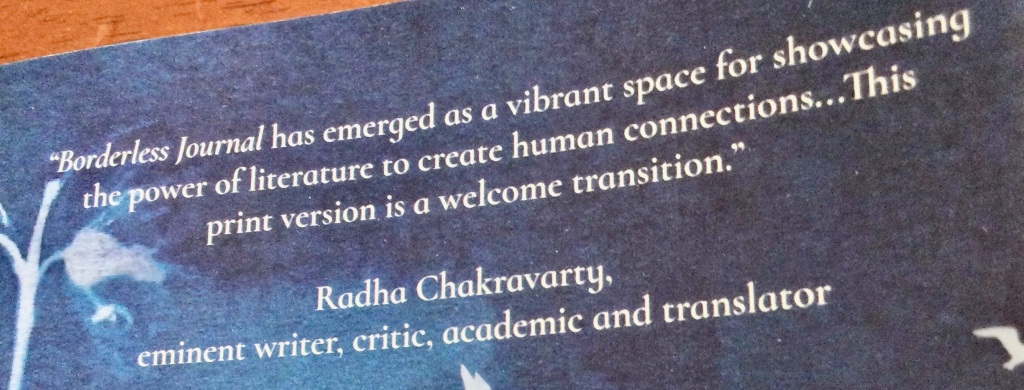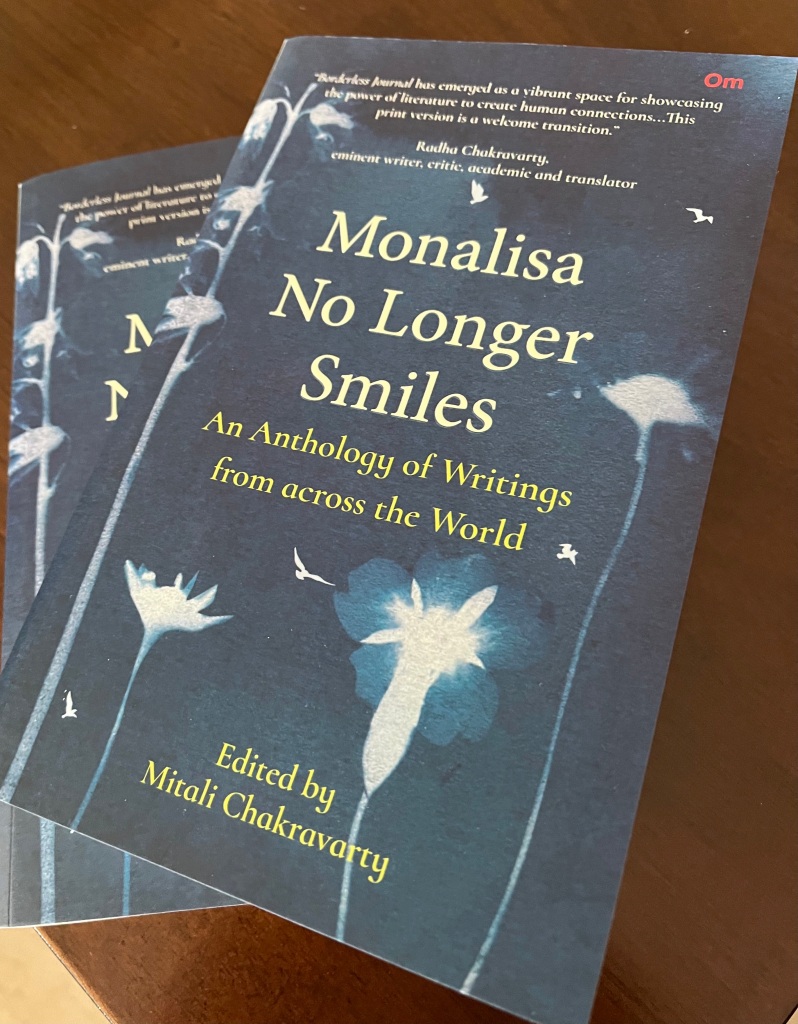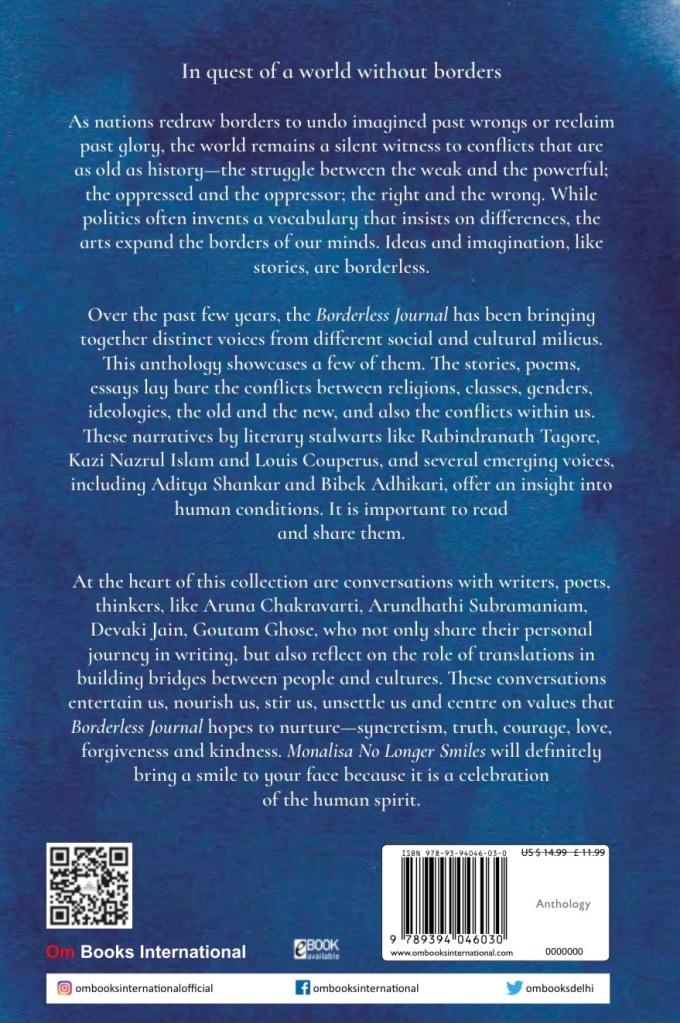
Editorial
We did it! … Announcing our first anthology … Monalisa No Longer Smiles… Click here to read.
Conversations
Suchen Christine Lim, an iconic writer from Singapore in conversation about her latest book, Dearest Intimate. Click here to read.
Blazing trails, as well as retracing the footsteps of great explorers, Christopher Winnan, a travel writer, delves into the past, and gazes into the future while conversing with Keith Lyons. Click here to read.
Translations
Rows of Betelnut Trees by My Window by Nazrul has been translated from Bengali by Professor Fakrul Alam. Click here to read.
A Day in the Life of the Pink Man is a story by Shankhadeep Bhattacharya, translated from Bengali by Rituparna Mukherjee. Click here to read.
The Clay Toys and The Two Boys is a story by Haneef Shareef, translated from Balochi by Fazal Baloch. Click here to read.
Saturday Afternoon is a poem by Ihlwha Choi, translated from Korean by the poet himself. Click here to read.
Tagore’s poem, Tomar Shonkho Dhulay Porey (your conch lies in the dust), has been translated from Bengali by Mitali Chakravarty as The Conch Calls. Click here to read.
Poetry
Click on the names to read
Jared Carter, Asad Latif, Rhys Hughes, Alpana, Mimi Bordeaux, Saranyan BV, Luis Cuauhtémoc Berriozábal, Quratulain Qureshi, Jim Bellamy, Sourav Sengupta, Ron Pickett, Davis Varghese, Ryan Quinn Flanagan, Jonathan Chan, Terry Trowbridge, Amrita Sharma, George Freek, Gayatri Majumdar, Michael R Burch
Poets, Poetry and Rhys Hughes
In Infinite Tiffin, Rhys Hughes gives an unusual short story centring around food and hunger. Click here to read.
Musings/Slices from Life
Prithvijeet Sinha writes of how Edvard Munch’s painting, The Scream, impacts him. Click here to read.
Mike Smith travels with a book to a Scottish beach and walks in the footsteps of a well-know novelist. Click here to read.
Ravi Shankar mourns the loss of a friend and muses on mortality in his experience. Click here to read.
Meredith Stephens writes of her experience of Covid. Click here to read.
Dim Memories of the Festival of Lights
Farouk Gulsara takes a nostalgic trip to Deepavali celebrations in Malaysia. Click here to read.
Musings of a Copywriter
In Strumming Me Softly with His Guitar…, Devraj Singh Kalsi talks of his friends’s adventure with the guitar. Click here to read.
Notes from Japan
In Therese Schumacher and Nagayoshi Nagai: A Love Story, Suzanne Kamata introduces us to one of the first German women married to a Japanese scientist and their love story. Click here to read.
Essays
My Favourite Book by Fakrul Alam
The essay is a journey into Fakrul Alam’s evolution as a translator. Click here to read.
The Ultimate Genius of Kishore Kumar
Shantanu Ray Chaudhuri, an eminent film critic, writes on the legend of Kishore Kumar. Click here to read.
T.S Eliot’s The Waste Land: Finding Hope in Darkness
Dan Meloche muses on the century-old poem and its current relevance. Click here to read.
The Observant Immigrant
In Piano Board Keys, Candice Louisa Daquin talks of biracial issues. Click here to read.
Stories
Ravi Prakash shares the story of the life of a migrant in rural India. Click here to read.
Monisha Raman unravels the past in a short narrative using the epistolary technique. Click here to read.
Red Moss at the Abbey of Saint Pons
Paul Mirabile takes us to St Pons Abbey in France in the fifteenth century. Click here to read.
Farhanaz Rabbani gives a light story with a twist that shuttles between Dhaka and Noakhali. Click here to read.
Book Excerpts
An Excerpt from Manoranjan Byapari’s How I Became a Writer: An Autobiography of a Dalit, translated from Bengali by Anurima Chanda. Click here to read.
An excerpt from Evening with a Sufi: Selected Poems by Afsar Mohammad, translated from Telugu by Afsar Mohammad & Shamala Gallagher. Click here to read.
Book Reviews
Reba Som has reviewed Aruna Chakravarti’s Through the Looking Glass: Stories. Click here to read.
Somdatta Mandal has reviewed Shehan Karunatilaka’s The Birth Lottery and Other Surprises. Click here to read.
Basudhara Roy has reviewed Afsar Mohammad’s Evening with a Sufi: Selected Poems, translated from Telugu by Afsar Mohammad and Shamala Gallagher. Click here to read.
Bhaskar Parichha has reviewed Rahul Ramagundam’s The Life and Times of George Fernandes. Click here to read.
Borderless Journal Anthology
Click here to access the Borderless anthology, Monalisa No Longer Smiles






